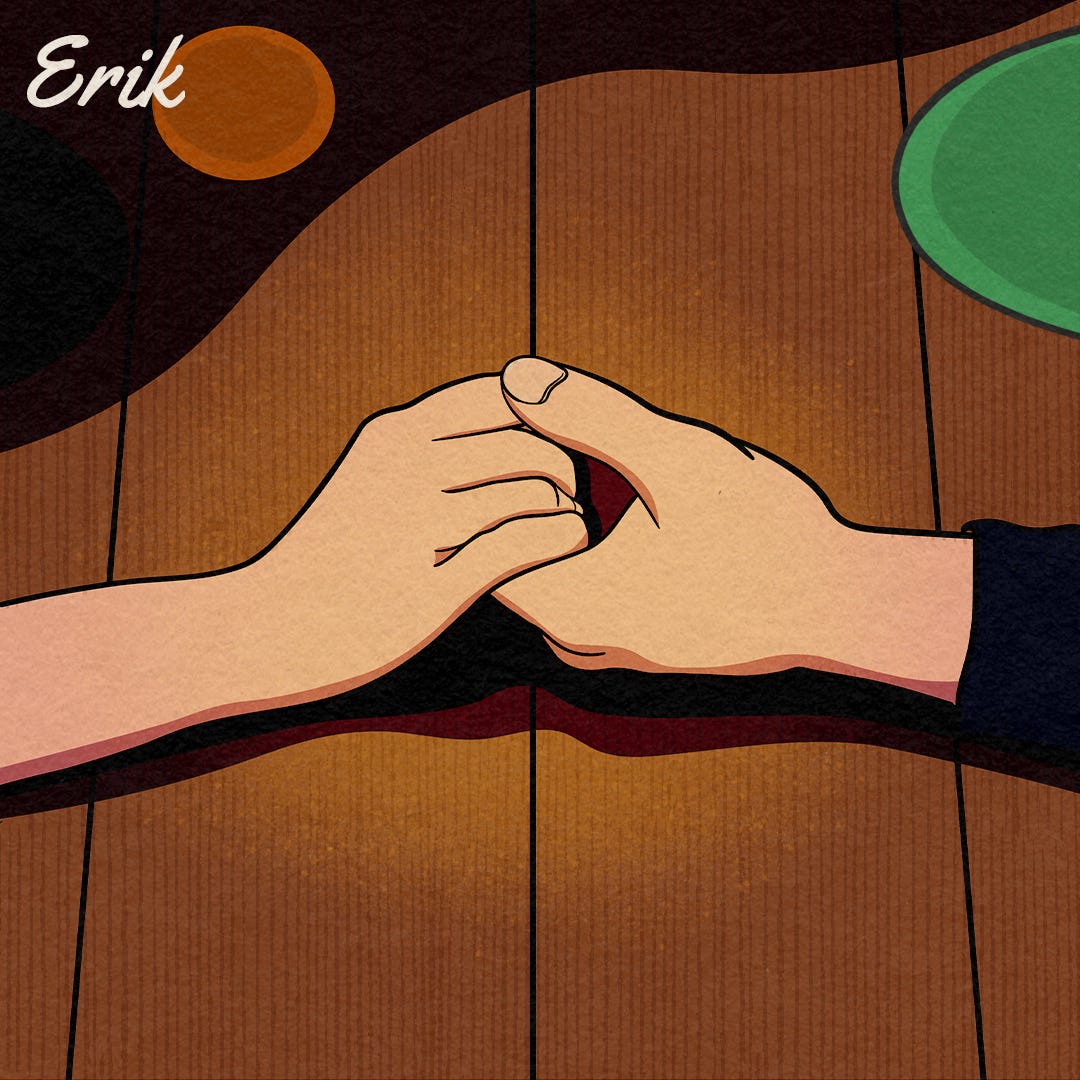🕯️ Erik
I see you. All of you. And I'm staying.
A broken man with addictive tendencies—too shy to be a metaphor. I twirled my hair as I read his file.
His scent broke my trance as he approached. I bit my lip as our eyes met.
“Hi.” He paused. “May I?”
“Please.”
He set down our cappuccinos. Brawn, sharp, there was more to him than he offered. I adjusted my skirt, crossed my legs. He noticed. I tilted my head as he spoke.
“Come with me. I want to show you something.”
He grabbed my hand, tantalizing my mind.
It is hard to resist a man who knows how to love.
✍️ Author’s Note
I wrote this during a time when I felt invisible in my own relationship—like I was pouring everything into someone who couldn’t see it. The song “Tribulation” by Matt Maeson captured that tension between wanting to be loved and believing you’re too broken to deserve it. But I wanted to flip the perspective: What if someone chose to stay? What if they saw past the warnings and chose you anyway?
There’s no right or wrong in that choice. What I learned was how lucky I was to have the capacity to love deeply at all. That ability—to fall completely, to give everything—isn’t a weakness. It’s a gift, even when it breaks you.
📖 Behind the Story
I wrote this during a challenging time—one of those periods where you wonder if the love you’re giving is even visible. I felt like I was pouring everything into someone who couldn’t see it, and the exhaustion of that was wearing me thin.
Worse, I’d started to believe I was the problem. That maybe I was too much, too broken, too damaged to be loved properly.
Then I heard Matt Maeson’s “Tribulation,” and something cracked open.
The song lives in that uncomfortable space between wanting someone and knowing you might destroy them. Maeson’s voice strains throughout—his frustration with himself is obvious. When the chorus hits, there’s this crescendo of tension: the desperate attempt to “burn just right” while knowing you’re probably going to fail.
What struck me most was the push-pull dynamic. The narrator knows he’s broken, warns his lover to run, yet stays. He’s addicted—not just to substances, but to the attempt at love despite being convinced he’ll never get it right.
There’s hope and resignation tangled together. A paradox: the knowledge of your failings, yet the desire to transcend them anyway.
The song lives in dusk rather than midnight. It’s dark, yes, but not hopeless. The struggle is ongoing, unresolved, but there’s no complete surrender either. That’s what “tribulation” means—an ongoing test, a trial you’re still walking through.
The bridge captured everything I was feeling: the tension between thinking you’re better alone and being completely consumed by someone. That obsession. That need.
But here’s where I flipped the script.
In the song, the narrator is the one saying “run from me.” In my relationship at the time, I’d become the one believing I needed to be run from. I’d internalized the idea that I was the broken one with addictive tendencies—addicted to loving too deeply, to giving too much, to hoping someone would finally see me and stay.
When I wrote “Erik,” I created the moment I desperately needed:
What if someone saw all the red flags you believed you had—and chose you anyway?
Not because they were naive. Not because they didn’t see the warnings. But because they looked past what you’d been taught to believe about yourself and saw something worth choosing.
I wanted to explore that moment—sitting across from someone who’s been told they’re too much, too intense, too broken—and choosing them. Seeing the beauty in their capacity to love deeply. Recognizing that what they call “damage” might actually be their greatest gift.
The truth is: those red flags I believed I had? Most of them weren’t real. They were scars from a relationship that made me think much less of myself.
When you’re with someone who can’t receive your love, you start to believe the problem is how you love rather than that you’re simply loving the wrong person.
This story was me coming to terms with that. Learning that my capacity to love deeply—to fall completely, to give everything—isn’t a flaw. It’s not something that needs to be fixed or warned about. It’s a gift.
💭 A Question for You
Have you ever believed you were “too much” for someone?
Or have you been the one who chose someone the world said was too broken, too intense, too complicated—and saw their beauty anyway?
If you enjoyed this story, consider becoming a paid subscriber. You’ll receive exclusive Studio Letters, craft breakdowns, and premium zine collections that dive deeper into the creative practice behind these pieces.



